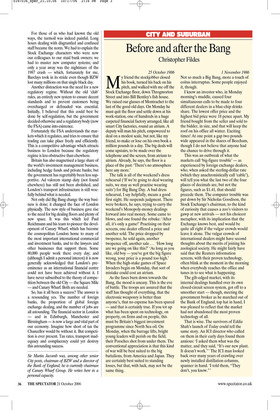Before and after the Bang
Christopher Fildes
25 October 1986
My friend the stockjobber closed his book, turned his back on his pitch, and walked with me off the Stock Exchange floor, down Throgmorton Street and into Bill Bentley’s fish house. We raised our glasses of Montrachet to the last of the good old days. On Monday he must quit the floor and settle down at his work-station, one of hundreds in a huge carpeted financial factory arranged, like all smart City factories, round an atrium. A deputy will man his pitch, empowered to deal on a modest scale, but not, like my friend, to make or lose on his own book a million pounds in a day. The big deals will come upstairs, to be made over the telephone and the screen, from atrium to atrium. Already, he says, the floor is a place of the past: ‘There’s no atmosphere here any more.’ The talk is all of the weekend’s dress rehearsal (‘If we’re going to deal wearing suits, we may as well practise wearing suits’) for Big Bang Day. A bad dress rehearsal, I say helpfully, means a good first night. He suspends judgment. There were brokers, he says, trying to carry the weekend’s Monopoly-money dealings forward into real money. Some came to blows, and one found the rebuke: ‘After all, it’s only a game!’ Practising on their screens, one dealer offered a price and another sold. The price dropped by twopence, he sold again, another twopence off, another sale... ‘How long are we going on like this?’ ‘As long as you like, old boy — you’ve got the big figure wrong, your price is a pound too high.’ When the high-stake games of Space Invaders begin on Monday, that sort of mistake could cost an atrium.
As the fuses burn down towards the Bang, the mood is uneasy. This is the eve of battle. The troops are assured that the staff has thought of everything, that the electronic weaponry is better than anyone’s, that no expense has been spared — and that is certainly true. If you tot up what has been spent on technology, on property, on firms and on people, this must be Britain’s biggest investment programme since North Sea oil. On Monday, when the barrage lifts, bright young leaders will perish on the field, their Porsches shot from under them. The conventional appreciation is that this kind of war will be best suited to the big battalions, from America and Japan. They are certainly best suited to standing losses, but that, with luck, may not be the same thing.
1 November 1986 Not so much a Big Bang, more a touch of coitus interruptus. Some people enjoyed it, though.
I know an investor who, in Monday morning’s muddle, caused four simultaneous calls to be made to four different dealers in a blue-chip drinks share. The lowest offer price and the highest bid price were 18 pence apart. My friend bought from the seller and sold to the bidder, in size, and that will keep the roof on his office all winter. Exciting times! At one point a gap two pounds wide appeared in the shares of Beecham, though I do not believe that anyone had the chance to drive through it.
This was an outbreak of what the markets call ‘big-figure trouble’ — as experienced by foreign exchange dealers, who, when asked the sterling-dollar rate (which they anachronistically call ‘cable’), will tell you what the last two of the four places of decimals are, but not the figures, such as $1.41, that should precede them. The computer trouble was put down by Sir Nicholas Goodison, the Stock Exchange’s chairman, to the kind of curiosity that causes a zoo’s visitors to gawp at new arrivals — not his choicest metaphor, with its implication that the Exchange knows best, and would be quite all right if the vulgar crowds would leave it alone. The vulgar crowds of international dealers might have second thoughts about the merits of joining his zoological society. He might fairly have said that the Reuters information screens, with their proven technology, often blink at the moment in the morning when everybody reaches the office and tunes in to see what is happening.
The gilt-edged market, with its internal dealings handled over its own closed-circuit screen system, got off to a smoother start — though, meeting the government broker as he marched out of the Bank of England, top hat in hand, I was pleased to reflect that the market had not abandoned the most proven technology of all.
That is wise. The survivors of Eddie Shah’s launch of Today could tell the same story. An ICI director who called on them in their early days found them anxious: ‘I asked them what was the matter, and they said, “It’s our new plant. It doesn’t work.”’ The ICI man looked back over many years of crawling over newly installed distillation columns, spanner in hand. ‘I told them, “They don’t, you know.”’


































































































 Previous page
Previous page